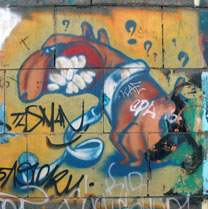|
St
Petersburg is an amazing and exciting city. It was founded in 1703
by Peter the Great, (hence the name). After regaining control of
this land from the Swedes, Peter built a grand city that was to
be the "most European" of any Russian city. It was the
capitol of Russia for more than 200 years and it's historic city
center is a UNESCO World Heritage Site. While we were only there
for the weekend, I have enough photos to choke a moose.
I would
highly recommend a trip to St. Petersburg to anyone who asks but
there are some tips to remember that will make traveling there a
wee bit less harrowing.
Plan
ahead - Know where you will arrive and how to get to your lodging
from there. Arrange your transportation ahead of time. Taxi drivers
are often, but not always honest and the ones at the train station
are apparently not to be trusted. You can book a taxi in advance.
Knowing our hotel was close to the station, we attempted to hoof
it and got hopelessly lost. Thank God for the honest taxi driver
that happened into us. We were actually only about 5 minutes away,
but walking the wrong direction.
Transportation
- Know how you will get to the sights you want to see from your
lodging. It's a big city folks. There is plenty of cheap public
transportation but the average bus driver knows little if any English.
While the charades we played with people in the subway system were
entertaining, it really didn't help us much.
Bring
a map of the city written in the Cyrillic alphabet. We all had
maps in Russian, but they were useless because the street signs
are written in the Cyrillic alphabet. Not similar at all.
Language
- Russia was isolated for the better part of the 20th century. Realize
that virtually NO ONE speaks English and deal with it. Many of those
that do, speak only "tourism" English. If you have the
opportunity to go with someone who is familiar with the language,
take it.
You
are a big, fat, slow-moving target. Plan accordingly. It's still
the wild west over there. Be smart.
The
following are sites in St. Petersburg that are simply not to be
missed:
| Church
on the Spilled Blood |
 |
 |
 |
 |
 |
 |
 |
 |
 |
 |
 |
 |
 |
 |
The
Church on the Spilled Blood was built from 1883 to 1907 to
mark the spot of the assassination of tzar Alexander II. Ironically,
Alexander was a reformist who was sympathetic to the typical Russian
peasant and subsequent rulers cracked down hard upon dissenters.
It's official name is the Church of the Resurrection, though it
also goes by Cathedral of the Ascension, Church of Our Savior on
the Blood and other monikers as well.
Architect
Alfred Parland won the design competition that stipulated only the
the church be designed in a purely Russian 17th century design.
Very similar to St Basil's Cathedral in Moscow, the interior is
decorated even more lavishly than the exterior with several thousand
square yards of Russian marble and at least 20 different local minerals.
The cathedral was spared demolition after the communist revolution
only because the large rooms and tall ceilings provided much need
warehouse space. Fully restored it is impossible to do it justice
with a camera.
| St.
Peter & Paul Cathedral & Fortress |
 |
 |
 |
 |
 |
 |
 |
 |
 |
 |
 |
 |
 |
 |
After
defeating the Swedes in 1703, the first order of business was to
build a fort. The St Peter & Paul Fortress was the first
structure built in St Petersburg. The unique cathedral, designed
by Domenico Trezzini, was completed in 1733. All the Russian tzars
from Peter I to Alexander III are buried beneath the cathedral.
Even Tzar Nicholas II and family were re-interred in the cathedral
80 years after their deaths. Gaudy is the only appropriate term
for the interior of this grand structure, but that is what we would
expect in a church for a 17th century tzar.
With
over 3 million exhibits, The Hermitage is the worlds 2nd
largest museum, (I believe the Smithsonian is the largest). The
Winter Palace is the primary building but just one of six structures
that make up the museum. They also have branches in Las Vegas and
Amsterdam. According to Wikipedia, it holds the Guiness world record
for the largest collection of paintings even after the soviets sold
about 2000 paintings deemed "bourgeois"
The
museum was founded in 1764 by Empress Catherine and is also one
of the oldest museums. The original works were given to the state
to settle unpaid debts. Of course in the early days, few people
except the emperor and empress ever saw the ever increasing collection
of art. In 1852 a new public museum was built to house the collection
and is widely thought to be the world's first structure built for
that express purpose. After the Soviet revolution, the museum became
property of the state and many formerly private collections were
added to the museum, including works taken from western Europe by
the nazis and later obtained by the Soviets.
A helpful
hint: The museum is so vast, one can never expect to see everything.
Pick the artists and types of work you are most interested in and
see those fist. Then allow yourself to wander aimlessly through
the halls and soak it all in.
All photos on this page are originals by & copyrighted by Daren
Willden, unless otherwise stated.
All rights reserved. Permission required to use
|

